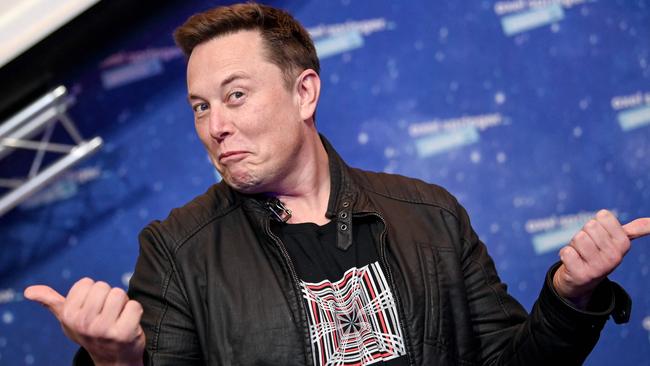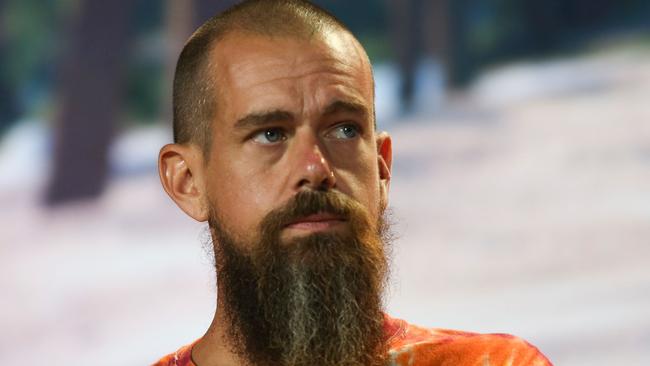Twitter co-founder Jack Dorsey faces a stark choice: endorse his pal Elon Musk’s takeover, or side with his handpicked successor
Twitter co-founder Jack Dorsey faces a stark choice between endorsing his pal Elon Musk’s takeover, or siding with his handpicked successor Parag Agrawal.

Jack Dorsey, the billionaire founder of Twitter, once told an interviewer that his weakness as a leader was that he was a “silent person”.
He said: “People often find it pretty unsettling...They intend to know my thoughts but I prefer staying silent most of the time.”
Amid the $US43bn fight for Twitter’s soul that has broken out between Elon Musk and the company’s board of directors, Dorsey has started to speak up - via Twitter, naturally.
After the company approved a “poison pill” this month to see off Musk’s unsolicited takeover bid, Dorsey wrote that the board had “consistently been the dysfunction of the company”. In response to another post of a Silicon Valley proverb saying that “good boards don’t create good companies, but a bad board will kill a company every time”, Dorsey responded: “Big facts.”
The messages were telling; an indication that the 11-member board, upon which Dorsey still sits, was perhaps not as harmonious as it might seem. Dorsey owns just 2 per cent of Twitter. Next month the 45-year-old is set to step down from the board, 16 years after he co-founded the company. Yet in the minds of many employees, and some of his fellow board members, he and Twitter are almost one and the same. His words carry extra weight.
David Friedberg, a Silicon Valley investor, summed up this view last week. “Jack is the linchpin in what is going to happen here. His point of view on whether he (Musk) should be the steward of this business going forward is gonna sway a big part of how this process is going to go,” Friedberg said on the All-In podcast.
When Musk tabled his $US54.20-a-share bid this month, it electrified the markets. But it was also met with scepticism. The famously mercurial billionaire had not shown any proof that, despite his $US270bn fortune, he could get the money together for the bid. Most of his wealth is tied up in the shares of Tesla and SpaceX, his rocket company.
On Thursday, however, he unveiled his financing plan: a $US12.5bn personal loan secured by Tesla shares, $US13bn in debt secured against Twitter, and $US21bn in cash from himself and any other investors he brings along. It would be the largest leveraged buyout in history, and partly financed by what could be the largest personal loan in history.
Bloomberg’s Matt Levine wrote: “The board’s best argument for blowing off Musk . . . was probably that he was hard to take seriously without real financing. Now it has to take him seriously.”
In the middle sits Dorsey, an eccentric, inscrutable billionaire who, in recent years, has formed a bromance with Musk. The pair share an enthusiasm for cryptocurrency, even joining a podcast together to rhapsodise about the potential of “internet-native currency”. When Musk’s Twitter account was hacked, he called his friend, who froze the account in minutes until it could be restored.

Faced with a coup attempt by activist investor Elliott Management in 2020, Musk tweeted in defence of Dorsey: “Just want [to] say that I support Jack as Twitter CEO. He has a good heart.” Dorsey returned the favour this month when Musk broke cover to announce he had snapped up 9 per cent of Twitter’s stock. He wrote: “I’m really happy Elon is joining the Twitter board! He cares deeply about our world and Twitter’s role in it.”
Days later, of course, Musk U-turned. He declined the board seat, tabled his bid and publicly declared his lack of confidence in chief executive Parag Agrawal, who Dorsey had handpicked as his successor in November.
Beyond Dorsey’s fiduciary duty, which requires him to vote on the plan most likely to deliver for shareholders, he will have to decide where his personal allegiance lies. Upon announcing Agrawal’s appointment last year, Dorsey wrote that the 37-year-old Indian was “behind every critical decision that turned the company around”. He added: “He leads with heart and soul, and I learn from him daily. My trust in him as CEO is bone deep.” Musk, should he bag Twitter, will fire Agrawal. Along with his bid, he wrote tartly: “I don’t have confidence in management.”
Indeed, should Musk succeed, Agrawal would most likely be one casualty of many. Musk, famously a workaholic, sleeping on Tesla’s factory floor for months at a time, is expected to take a sledgehammer to the culture of Twitter. With its monthly “day of rest” and the pliant “work from anywhere” model it offers employees, Twitter is a manifestation of Dorsey’s sensibilities come to life.
The self-taught programmer wrote the code for Twitter in 2006, inspired by the bursts of chatter used by police and the emergency services that he spent a lonely youth eavesdropping on via a police scanner he had at his home. As chief executive, however, he struggled. In 2008 he was forced out after the board tired of his erratic management and his penchant for taking time out to indulge other interests, such as hot yoga and sewing.
He returned in 2015 after Twitter had cycled through another couple of chief executives, against a backdrop of Game of Thrones-style boardroom jockeying. As a business, it struggled, racking up losses year after year and struggling to innovate.
One insider said the company was “typified by inaction”, with big decisions debated for weeks or months before being finally delayed, sometimes indefinitely, by Dorsey. The pace of innovation in the later years of Dorsey’s tenure at Twitter increased and he even managed to tip the company into profit for a couple of years - 2018 and 2019.
Under Dorsey, however, Twitter also struggled to grapple with content moderation, which appears to be the main driver for Musk’s bid. The world’s richest man said the platform is the “de facto town square” and should adhere firmly to free speech principles. This would probably mean removing the guardrails that Dorsey and his team have put into place in recent years.
These days Dorsey can be seen walking to the headquarters of Block, the $US65bn payments giant he founded across the street from Twitter in downtown San Francisco, often in all black, with a shaved head, nose ring and lengthening beard. Once clean-cut, he has taken on the vibe of techno-shaman, favouring a certain manicured shabbiness that belies a net worth estimated at $US6.7bn.
As Musk raises the pressure, Dorsey must decide: does he throw his outsized influence behind Musk’s hostile takeover, and allow the Tesla tycoon to turn the company upside down, and the culture he instilled inside out? Or does he spurn his billionaire bestie and side with Agrawal, betting that the newbie can finally turn Twitter around and, crucially, get the share price reliably back up above the $US54.20 price Musk has tabled.
Only Dorsey knows what he is thinking.
Canonical Link: https://www.thetimes.co.uk/article/d-day-for-the-techno-shaman-c738wmmwp


